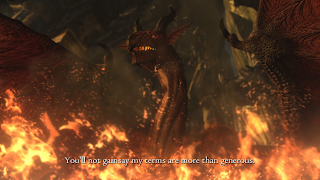In a vain attempt to protect their home, the resident of a fishing village assaults Grigori (a red dragon) who is attacking the village. Impressed with their courage and zeal, Grigori tears out the villager's heart and consumes it. The ordeal marks the villager as "Arisen" - an individual of strong will, chosen by the dragon. In order to reclaim their stolen heart and halt the worlds destruction, the Arisen must defeat Grigori in battle.
The plot is almost non-existent in Dragon's Dogma. There is a clear beginning and end, but the events that occur in-between are a little unfocused and padded out with innumerable "fetch x number of items" or "kill x number of enemies" type side quests. For an RPG, there is surprisingly little dedicated to character development or storytelling. The most important characters are only ever given a few lines of dialogue in one or two scenes and then they vanish from the story. One character is even from far off lands, having come to Gransys to aid against the dragon, but you never actually see them do anything. So little is revealed in-game about the world, its people and its lore that it further compounds the already generic setting; Gransys is covered in standard landscapes like fields, forests, ravines, and plains. Almost nothing in Dragon's Dogma's world stands out from the slew of other medieval fantasy games.
The game was clearly built with a male protagonist in mind, mimicking the classical fairy tale scenario of a brave knight saving a fair maiden from a fire breathing dragon. If you’re playing as a female character some parts may get a little weird, particularly one romantic plot thread involving a certain married woman. There is also a hidden social system in place that the game never tells the player about. Every time the Arisen talks to an NPC, completes a quest for them or shoves them, it affects their opinion of the Arisen. The social system doesn't affect much and was probably tacked on for the sake of one scene (highlight to read):
When the Arisen finally faces off against the dragon Grigori they find that their "beloved" is being held captive by the dragon.
The Arisen's lover is always whichever NPC they have the highest social stat with, which leads to a confusing and sometimes awkward final confrontation with Grigori. During my first playthrough I thought Grigori was mocking me when my "beloved" - a large woman I didn't recognize - came running towards me. It wasn't until the after battle scene played that I realized the game was being dead serious.
You do not have a reason to visit or talk with your "beloved" after the Grigori battle.
The ring is a recurring theme: an eternal bond and a never-ending cycle.
One constant "pawn" companion is given to the player that they can name and customize to the same degree as the player character. Two additional pawns can be enlisted into the party, but they are not a permanent addition to the group. A vocation (class) is selected for both the Arisen and their main pawn: fighter, strider or mage. Once the Arisen or their pawn are familiar enough with a particular vocation they can further specialize in it (Warrior, Ranger, Sorcerer) or choose a combo class (Mystic Knight, Assassin, Magick Archer). The vocation determines what skills, weapons, and armor a character has access to. The armor system in Dragon's Dogma is rather unique in that individual pieces stack, giving the player an immense array of customization options with relatively few pieces.
Battles against large enemies are common and thrilling; easily the best thing in the game! Large beasts can be scaled and stabbed. Exploding barrels can be lifted and hurled at flying enemies to set them ablaze, and tails can be severed or heads lopped off. Some beasts target women (or men in dresses) first, while others grab their victims and run. Nocturnal monsters prowl the night in greater numbers than the day shift making nights an especially dangerous time to be on the road. Each creature has its strengths and weaknesses, like some only being vulnerable to magic. Learning how to exploit them is essential for surviving the tough but fair combat (in the original release). The Dark Arisen re-release made the game easier and added in Normal/Hard/Speedrun modes.
The land of Gransys is expansive, but not as big as most other open-world RPGs, which is a good thing, because Dragon's Dogma literally makes you walk everywhere! I can get behind slowing down to take in the game world, but being forced to traverse the same areas again, and again, and again, gets repetitive fast when the landscape is as barren and generic as Gransys. There is a quasi-fast travel system in the form of a one time use ferry-stone that will teleport the player to portcrystal locations. These stones are rare and expensive in the original release. The Dark Arisen expansion and re-releases give the player a free "eternal" ferry-stone to help cut down on the repetition.
The main plot-line lacks substance, but compensates for it with fun, unique combat. There is a surprising amount of experimentation: food that spoils, a layered armor system, a forger that can copy any item, and body-lanterns that go out when wet, etc. The attention to detail; the scales and wings on many of the creatures, were impressive for the time and still are. Overall, Dragon's Dogma was quite enjoyable to play. I just wish the game had more personality and a story that gave you a reason to care.
First posted to videogamegeek.com on December 1, 2019.
Related Reviews:


















No comments:
Post a Comment